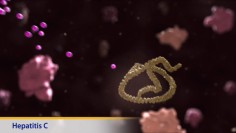
Hepatitis C: Children Infected at Birth
What is hepatitis C?
Hepatitis C is a viral infection of the liver. The liver becomes inflamed and may stop working properly. The disease may progress rapidly, but it is more commonly a mild, slow, and chronic disease in children.
What is the cause?
Hepatitis C is caused by a virus. The virus is spread through contact with infected blood. Adults can get hepatitis C from sharing razors or needles, or from having unprotected sex with someone infected with hepatitis C. Babies can be exposed to mother's blood during pregnancy, especially during birth. Casual contact, including contact in daycare, does not spread hepatitis C. In the past, people could get hepatitis C from blood transfusion. Today, blood donors are screened for the virus, and their blood is not used if it is infected.
How is it diagnosed?
About one in twenty babies born to mothers infected with hepatitis C will get the infection. The baby may be tested for hepatitis C antibodies after birth. Because mothers give their own antibodies to their fetus, the baby after delivery will have these antibodies. This is normal and does not mean the child has the infection. It takes many months to know if your child is truly infected.
After about 18 months, it is important to have your toddler tested for hepatitis C. If the toddler does not have the disease, the antibodies will all be gone. If the baby has the disease, the test will show hepatitis C antibodies.
Another way to check for hepatitis C in babies is to check for the virus itself (not antibodies). This can be done with a blood test called RT-PCR (reverse transcriptase polymerase chain reaction).
It is not known whether hepatitis C is passed through breast milk. However, it is recommended that you do not breast-feed if you have a cracked or bleeding nipple.
What are the symptoms?
Symptoms of hepatitis C may be mild or there may be no symptoms at all. Symptoms, when present, may include:
- loss of appetite
- tiredness
- fever
- nausea.
How is it treated?
There are new treatments for hepatitis C, but they have side effects and do not work for everyone. If your child has hepatitis C, he or she should be referred to a liver specialist. The specialist will talk with you about risks and benefits of treatment. Children will need to visit their healthcare providers often for blood tests and physical exams.
Contact your child's healthcare provider if:
- Your child's appetite continues to decrease.
- Your child has worsening tiredness.
- Your child has vomiting, diarrhea, or abdominal pain.
- Your child develops jaundice.
- You have additional questions about hepatitis C infection.
Last modified: 2009-12-10
Last reviewed: 2010-11-29

